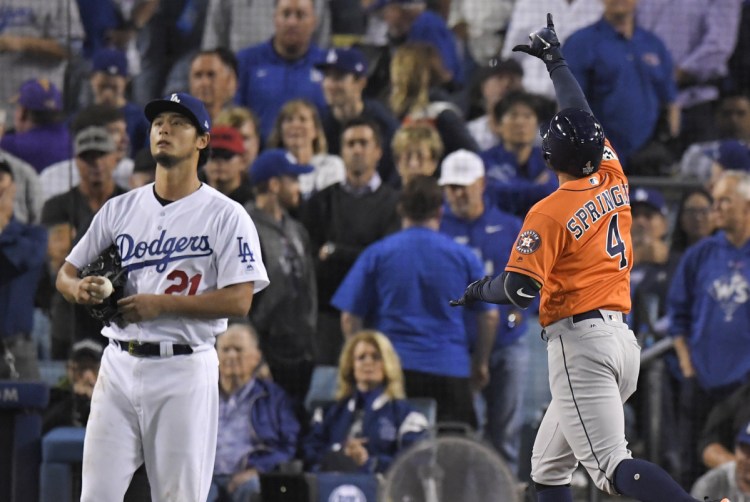MESA, Ariz. — A higher glove. A grip change. A subtle shift on the mound.
One subconscious move turns into a whisper in the dugout. A perceptive hitter tells his friends, and his friends tell their friends, and a seemingly innocuous habit – practically undetectable for most of the world – quickly becomes a major problem.
Even for the mighty Clayton Kershaw.
It’s hard to tell how often it happens, but pitch tipping pops up enough that it’s on the radar of managers and coaches around the big leagues.
“We try to keep a hand on that a lot, like are our guys giving away pitches?” Cleveland Manager Terry Francona said. “For sure, we always keep track of that.”
The issue of pitch tipping – a physical indication of some sort that reveals what pitch is coming next – stepped to the forefront when Yu Darvish was rocked by the Houston Astros in the World Series. Then it traveled to Chicago when Darvish finalized a $126 million, six-year contract with the Cubs last month in one of the biggest deals of this round of free agency.
Darvish, 31, who can throw seven different pitches, reportedly had issues with pitch tipping a couple times last year. After his final start with Texas, when he was charged with 10 runs in 32/3 innings in a 22-10 loss to Miami, Darvish said he was pausing before throwing his fastball and was faster with his delivery for breaking balls.
He was traded July 31 to Los Angeles and helped the Dodgers win the NL pennant for the first time since 1988. He won his first two playoff starts, allowing two runs in 111/3 innings.
But Darvish flopped in the World Series. He lasted just five outs in each of his two appearances, taking the loss in Game 7. Sports Illustrated reported in December that he was tipping his pitches, citing an unnamed Astros player.
“Obviously the Astros are a great, strong team, so I don’t really know, to be honest, if they knew my pitches,” Darvish said through an interpreter after his first spring start with the Cubs. “They could simply be a good, strong team. And then I think part of it was me not being at the top level in the World Series.”
But Darvish worked on being more deceptive over the winter.
“I’ve tried various things to keep consistency and mix up pitches, and throw from the same slot,” he said. “I’ve tried many things throughout this offseason to make adjustments for that.”
No one around Chicago seems too concerned. With pitching coach Jim Hickey, special assistant to baseball operations Jim Benedict, hitting coach Chili Davis and Manager Joe Maddon, the Cubs have plenty of experienced eyes on Darvish.
Hickey had a successful run under Maddon as the pitching coach in Tampa Bay, Benedict spent the previous two seasons as the vice president for pitching development for Miami and Davis played in the major leagues for 19 years.
“I don’t even know to what extent that was overblown. We’re going to find out,” Maddon said. “But we have our own internal methods to try to fix things.”
Darvish has some company. Kershaw, a three-time NL Cy Young Award winner with the Dodgers, said he worked through some pitch-tipping issues early in his career, and Maddon said almost every game someone thinks they picked up something with the opposing pitcher, to varying degrees of success.
Kershaw said the best defense is the people around you.
“I think guys are really good at picking that stuff up, so really you just need to have good teammates or good coaches that can pick that stuff up, that can help you fix it if you need it,” he said.
From a hitter’s perspective, pitch tipping is sometimes found in pre-series scouting. It also comes up in the dugout during the game, and some players have reputations for their ability to pick up the subtle differences. Maddon singled out former major leaguers Eddie Perez and Jim Edmonds for their expertise.
Sometimes hitters get it wrong, leading to some foolish swings at the plate. And sometimes it doesn’t matter.
“There’s times where we’ll see it but we’re not too sure the opponent does,” Francona said.
“Then you kind of are like, is it worth it, guy’s out there throwing a shutout. It’s a balance, but we try to keep track of it because some of these teams are really good at it and if they know what’s coming, they’re going to be much better hitters.”
Copy the Story LinkSend questions/comments to the editors.



Success. Please wait for the page to reload. If the page does not reload within 5 seconds, please refresh the page.
Enter your email and password to access comments.
Hi, to comment on stories you must . This profile is in addition to your subscription and website login.
Already have a commenting profile? .
Invalid username/password.
Please check your email to confirm and complete your registration.
Only subscribers are eligible to post comments. Please subscribe or login first for digital access. Here’s why.
Use the form below to reset your password. When you've submitted your account email, we will send an email with a reset code.